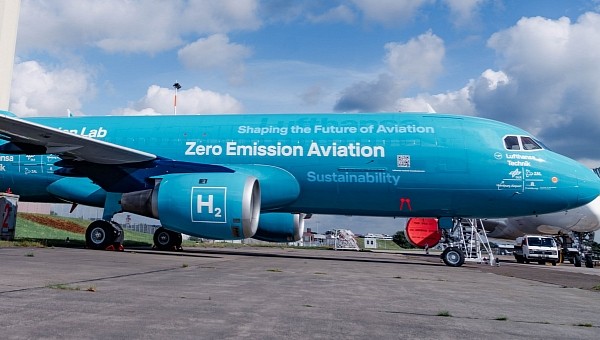“Hydrogen Aviation Lab” sounds like the name of a facility, but it actually refers to an aircraft. More specifically, a retired Airbus A320 will be used as a research platform for advancing hydrogen-powered aviation.
While SAF (sustainable aviation fuel) is seen by most players in aviation as the fastest and easiest solution for green flights, hydrogen-based propulsion systems are being researched as the long-term answer. Unlike SAF, which can be used as a drop-in fuel today, hydrogen requires modifications to the aircraft and the ground infrastructure. This means a lot of research and testing. For this purpose, a world-first Hydrogen Aviation Lab was inaugurated in Hamburg, Germany.
The project is the result of the cooperation between Lufthansa, the German Aerospace Center (DLR), the ZAL Center for Applied Aeronautical Research, and the Hamburg Airport, and is funded by Hamburg's Ministry of Economic Affairs and Innovation, and the city's investment and development bank.
An Airbus A320 that was operated by the Lufthansa Group for 30 years will be turned into a research platform. The old airliner will no longer fly but will serve science through ground-based research. The repurposed A320 was recently inaugurated in Hamburg as the new Hydrogen Aviation Lab but will be fitted with the components for hydrogen conversion, such as the tank and the fuel cell, over the next months.
In addition to the test flying suite, the A320 will also get an internal tank for liquid hydrogen. A supporting infrastructure will also be used for future testing.
The project partners want to develop and then test ground-based processes and maintenance protocols for hydrogen technology. The main focus is not the propulsion system but the infrastructure. For example, with the technology available today, hydrogen refueling for a long-haul flight could take hours. This is why the project will focus heavily on cutting refueling time and integrating it into the airport infrastructure.
While the Hydrogen Aviation Lab stays put on the ground, a digital twin will also be created in order to simulate flight conditions. Lufthansa and its partners believe that hydrogen-powered airliners could enter service within the next decade.
The project is the result of the cooperation between Lufthansa, the German Aerospace Center (DLR), the ZAL Center for Applied Aeronautical Research, and the Hamburg Airport, and is funded by Hamburg's Ministry of Economic Affairs and Innovation, and the city's investment and development bank.
An Airbus A320 that was operated by the Lufthansa Group for 30 years will be turned into a research platform. The old airliner will no longer fly but will serve science through ground-based research. The repurposed A320 was recently inaugurated in Hamburg as the new Hydrogen Aviation Lab but will be fitted with the components for hydrogen conversion, such as the tank and the fuel cell, over the next months.
In addition to the test flying suite, the A320 will also get an internal tank for liquid hydrogen. A supporting infrastructure will also be used for future testing.
The project partners want to develop and then test ground-based processes and maintenance protocols for hydrogen technology. The main focus is not the propulsion system but the infrastructure. For example, with the technology available today, hydrogen refueling for a long-haul flight could take hours. This is why the project will focus heavily on cutting refueling time and integrating it into the airport infrastructure.
While the Hydrogen Aviation Lab stays put on the ground, a digital twin will also be created in order to simulate flight conditions. Lufthansa and its partners believe that hydrogen-powered airliners could enter service within the next decade.







